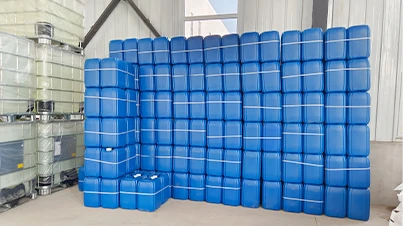Scaling and Corrosion Prevention Techniques for Optimal Cooling Tower Performance
Scale and Corrosion Inhibitor for Cooling Towers
Cooling towers are essential components in various industrial processes, providing cooling through the evaporation of water. However, they face significant challenges from scale formation and corrosion, both of which can impact their efficiency and operational lifespan. This article explores the importance of scale and corrosion inhibitors in maintaining the efficacy of cooling towers.
Understanding Scale Formation
Scale formation occurs when dissolved minerals in water precipitate out and accumulate on surfaces within the cooling tower system. Calcium carbonate, calcium sulfate, and silica are the most common scaling agents. As water evaporates, mineral concentrations increase, leading to unwanted deposits on heat exchangers and other critical components. This buildup can significantly reduce heat transfer efficiency, leading to higher energy consumption and operational costs. Moreover, excessive scaling can cause equipment failure, necessitating costly repairs or replacements.
The Role of Corrosion
Corrosion, on the other hand, involves the gradual deterioration of materials, typically metals, due to chemical reactions with their environment. In cooling towers, corrosion is often exacerbated by factors such as oxygen ingress, acidity, and high temperatures. Rust and other forms of corrosion not only compromise structural integrity but also lead to leaks and inefficiencies in the system. The repair and replacement of corroded components can incur substantial costs and downtime, impacting overall productivity.
Inhibitors A Solution to Scale and Corrosion
scale and corrosion inhibitor for cooling tower

To combat these two prevalent issues, the use of chemical inhibitors has become a standard practice in cooling tower maintenance. Scale and corrosion inhibitors work by modifying the chemical and physical processes that lead to deposition and deterioration.
Scale Inhibitors These chemicals, such as polyacrylic acid and phosphonates, interfere with the crystallization of scale-forming minerals, preventing them from adhering to surfaces. By maintaining the minerals in a dissolved state, scale inhibitors help ensure that water remains clear and equipment surfaces are protected. Regular monitoring and treatment with scale inhibitors can significantly reduce scale-related operational issues, enhancing the efficiency and lifespan of cooling systems.
Corrosion Inhibitors Corrosion inhibitors function by forming a protective film on metal surfaces, thereby minimizing the contact between the metal and corrosive agents. Common corrosion inhibitors used in cooling towers include nitrites, molybdates, and phosphates. These compounds can reduce corrosion rates by altering the electrochemical processes that lead to metal deterioration. Additionally, maintaining optimal water chemistry, including pH levels and conductivity, is vital in maximizing the effectiveness of these inhibitors.
Best Practices for Implementation
Implementing scale and corrosion inhibitors effectively requires a comprehensive water treatment program tailored to the specific needs of the cooling tower system. Regular water quality testing is essential to ensure that the chemical concentrations of inhibitors are adequate for the prevailing conditions. Moreover, maintaining proper water circulation and reducing exposure to environmental contaminants can further enhance the performance of inhibitors.
Conclusion
In conclusion, the application of scale and corrosion inhibitors is critical for the efficient and sustainable operation of cooling towers. By preventing scale buildup and minimizing corrosion, these inhibitors help maintain optimal heat transfer efficiency, reduce energy consumption, and extend the life of cooling equipment. Organizations that prioritize their water treatment strategies by incorporating effective inhibitors will not only save on operational costs but also contribute to more environmentally responsible practices in industrial operations. Proper management of cooling towers, including a proactive approach to scaling and corrosion, is essential for any facility aiming for operational excellence in a competitive landscape.
-
Water Treatment with Flocculant Water TreatmentNewsJun.12,2025
-
Polymaleic AnhydrideNewsJun.12,2025
-
Polyaspartic AcidNewsJun.12,2025
-
Enhance Industrial Processes with IsothiazolinonesNewsJun.12,2025
-
Enhance Industrial Processes with PBTCA SolutionsNewsJun.12,2025
-
Dodecyldimethylbenzylammonium Chloride SolutionsNewsJun.12,2025





